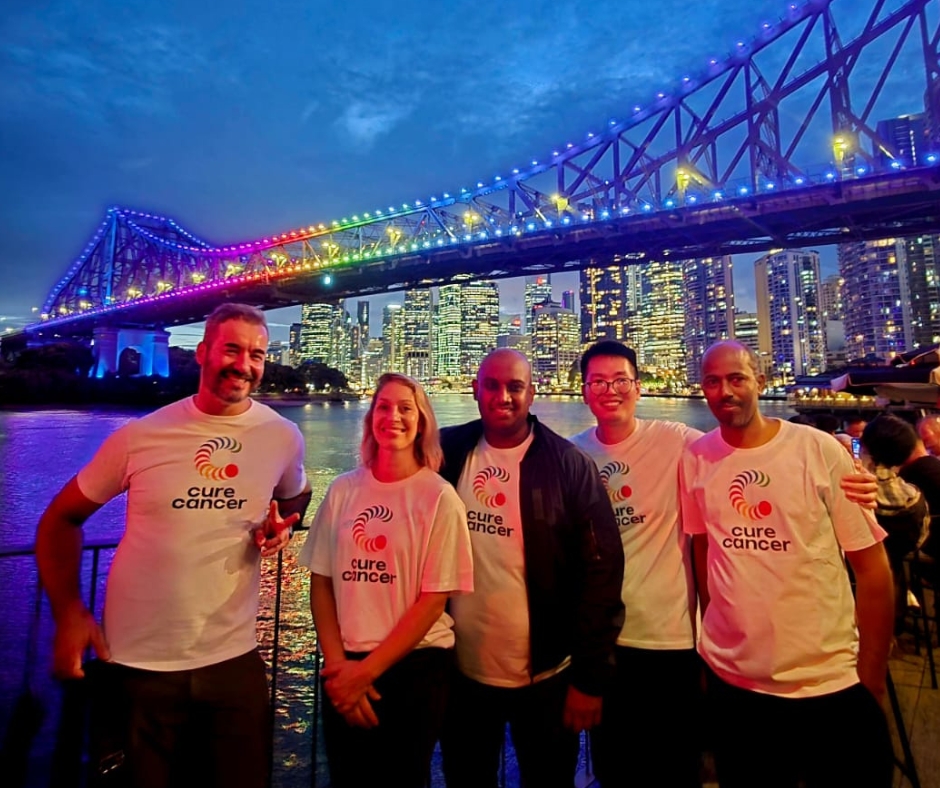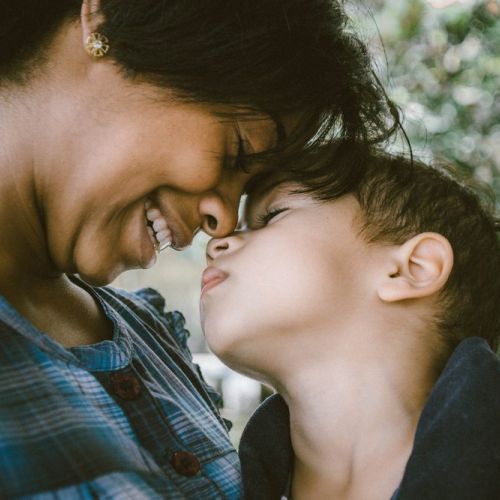'I’m proof that this research works': Wentworth star Kate Jenkinson shares her story
By Sylvia Lee | 30 September 2022
For Gynaecological Cancer Awareness Month, we caught up with Kate Jenkinson, who experienced a gynaecological cancer scare in her early 30s.

Courtesy of Kate Jenkinson
Kate Jenkinson is one of the most familiar and beloved faces on Australian TV. Best known for playing Allie Novak in the internationally-acclaimed, gritty prison drama ‘Wentworth’, she’s also the titular character in Nine Network’s ‘Amazing Grace’, Tara Khourdair in the highly rated medical drama ‘Doctor Doctor’, and internationally, Kendall Quinn in Rebel Wilson’s ‘Super Fun Night’.
As a Cure Cancer Ambassador, Kate is a fierce advocate for cancer research and raising awareness of gynaecological cancer: a group of seven different types of cancers that develop from abnormal cells in the ovaries, uterus, endometrium, cervix, vagina, vulva, fallopian tubes, or placenta.
Ten years ago, Kate had a routine pap smear that led to the detection of precancerous cells in her cervix, which she had to have surgically removed. This was a defining moment that saw her benefit directly from cancer research. It also brought her attention to the importance of gynaecological health.
Cure Cancer Communications Executive Sylvia Lee caught up with Kate to chat about her gynaecological cancer scare and the importance of normalising discussions about women’s health.
WHAT DREW YOU TO BECOMING AN AMBASSADOR FOR CURE CANCER?
Everybody in this country – and around the world – knows someone who has been affected by cancer. It's something that we can all understand and feels close to us. The amazing thing about Cure Cancer is that you’re proving that it's not a death sentence. It's not this unknown thing that it used to be. There is a way forward and a path for those who have a diagnosis.
I'm the kind of person who feels compelled to help when asked and I think that an ambassadorship for this kind of organisation is truly an honour. If I can raise awareness for an issue that is affecting so many Australians and people all around the world, I think it's my duty to do that.
YOU SAID EARLIER THAT WE ALL KNOW SOMEONE WHO'S BEEN AFFECTED BY CANCER, BUT 10 YEARS AGO, YOU HAD YOUR OWN GYNAECOLOGICAL CANCER SCARE. WHAT LED TO THE DISCOVERY OF THOSE PRECANCEROUS CELLS AND WHAT WAS THE TREATMENT LIKE?
Like many women in the world who have access to decent health care, I was getting regular pap smears. This has been drilled into me by doctors because it's something you need to do as a woman – I should say people with uteruses, actually –, so I was just doing my due diligence.
I got a call from the doctor to say that there were abnormalities in the results. I didn't have any symptoms whatsoever. I remember thinking, ‘Well, I had blood tests, I had a pap smear… What could possibly be wrong with me?!’ I was referred to a gynaecologist and from there, I discovered that I indeed had precancerous cells. Thank goodness they were precancerous!
Because of the decades of incredible cancer research and funding, I was put on a plan and I had surgery to remove those cells. Now I'm extra diligent about getting follow-up pap smears and visits to my gynaecologist as I'll have to keep an eye on this for the rest of my life.

Courtesy of Kate Jenkinson
WHEN THIS WAS ALL HAPPENING, WHAT KIND OF FEELINGS AND THOUGHTS WERE COMING UP FOR YOU?
The main feeling was overwhelming gratitude and relief. Because I was able to speak to so many people who really knew what they were talking about. They were able to reassure me that this was incredibly common and that the treatments are highly successful.
Obviously, it's not something that you choose to go through. But I'm acutely aware that people receive cancer diagnoses all the time. I mean, the statistics about cancer in this country are just astonishing! While my news was a wake-up call, considering what it could have been, I'm incredibly grateful that it was caught early.
IT SOUNDS LIKE WHEN YOU DISCOVERED THAT YOU HAD THOSE PRECANCEROUS CELLS, YOU HAD MANY QUESTIONS. WHAT LEVEL OF AWARENESS DID YOU HAVE ABOUT GYNAECOLOGICAL CANCER AND WHAT CONTRIBUTED TO YOUR LEVEL OF AWARENESS?
Before all this happened, I really didn't know much about gynaecological cancer or what could happen to my own reproductive system. But receiving the news about those precancerous cells and going through surgery and recovery led me to become educated.
Meeting people day to day made me realise that a lot of people go through this and it is more common than people think. I think that’s kind of an indictment about 'women's issues' – and I use that term loosely.
What are historically known as 'women's issues', they're just not talked about. I'm only 41 years old, so I'm not from a different era. I grew up not talking about my bits and how they work. If you mentioned the word 'period' at school, everyone covered their eyes and screamed!
A lot of these issues are just not spoken about because they're considered taboo or they're considered ‘sacred women's business' that should not be discussed in public.
I think that's actually problematic across the board with other health issues in Australia. I know that mental health issues are seriously stigmatised as are gynaecological issues. I think a lot of unwellness and illness in this country are stigmatised and I just don't see why. It happens. It's a part of being human.

Kate with her son, Fletcher. Courtesy of Kate Jenkinson
WHAT DO YOU THINK WE CAN ALL DO TO ADDRESS THE LIMITED AWARENESS AND STIGMA AROUND GYNAECOLOGICAL CANCER?
I think with gynaecological cancer and any kind of cancer or issue that is perhaps swept under the rug, communication and transparency are everything. That's why social media is so important. When I have those days where I feel like shutting it all off completely for good and switching off online, I can't because it is truly such a uniquely efficient way of spreading important information.
A lot of people are fearful of going to the doctor and so I’m raising my hand and saying, 'I went through it, the treatment was available, and I survived it. You can too'.
If my story and my partnership with Cure Cancer can help even just one other person notice what's going on in their body and not be afraid to go to the doctor if they feel that something isn't right, then it's worth it.
IN LINE WITH THAT, WHY IS IT IMPORTANT TO SUPPORT EARLY CAREER CANCER RESEARCH, ESPECIALLY WHEN GYNAECOLOGICAL CANCER IS SO UNDERFUNDED?
All cancer research is incredibly important, including gynaecological cancer. Supporting a future where our children don't have to worry about dying early because of cancer is something that is absolutely worth the price tag. I'm proof that this research works as it helps people catch cancer early or detect precancerous cells.
We are so lucky in this country that funding is available thanks to amazing organisations like Cure Cancer. But it's not enough. We can't just rely on the government to support these causes, unfortunately; we need to reach out to the community as well.
Because cancer is such an epidemic in Australia, we can't just sweep it under the rug because chances are, if it has not affected you directly, it will affect someone that you know.
FINALLY, I’D LIKE TO ASK YOU ABOUT YOUR WORK AS AN ACTOR. YOU'VE PLAYED A LOT OF POWERFUL WOMEN LIKE ALLIE IN ‘WENTWORTH’ AND GRACE IN ‘AMAZING GRACE’ - WHAT LESSONS HAVE YOU LEARNED FROM THESE CHARACTERS THAT YOU WILL BE TAKING WITH YOU INTO THE FUTURE AS A CURE CANCER AMBASSADOR?
Oh my gosh, that’s such a good question! Allie and Grace are such different women. But they are unified in the sense that they are aware of their own flaws, which they accept as a part of being human. As humans, we're flawed, we can be frail, and we can't exist alone. We need support around us.
Allie and Grace truly relied on the supportive family around them, whether it was a family of friends or a biological family because life is hard and shit happens. Things are not always going to go well; you're not always going to be in good health.
‘Wentworth’ was a brutal, brutal show when I think back on it. Hopefully, no one has to go through anything quite as traumatic as what happened within those prison walls, but ultimately, it was a reflection of what happens in real life. In real life, people do suffer unexpectedly tragic turns in their health. But if you have a good support system around you, that's the best thing that you can possibly have. Because when things don't go to plan, you have access to support, and I think that’s what organisations like Cure Cancer do. You guys provide that support and are funding research that is helping to forge a future where cancer is not a death sentence anymore and nor should it be. I can't think of a better cause to get behind for all Australians!

Kate dressed in her prison get-up on the ‘Wentworth’ set. Source: Instagram (@katejenko)
In Australia, the risk of being diagnosed with gynaecological cancer by the age of 85 is approximately 1 in 23. Women are not the only population group that can develop gynaecological cancer; trans men, nonbinary and intersex people can be diagnosed too.
At Cure Cancer, we champion early-career researchers, like Dr Shafiq Syed and Dr Tracy O’Mara, who are investigating new treatments for gynaecological cancer, a historically underfunded cancer type.
For more information, you can read the Cure Cancer guide to gynaecological cancer, including the symptoms to look out for and treatment options. You can also check out our early-career researchers' successes in gynaecological cancer research.










